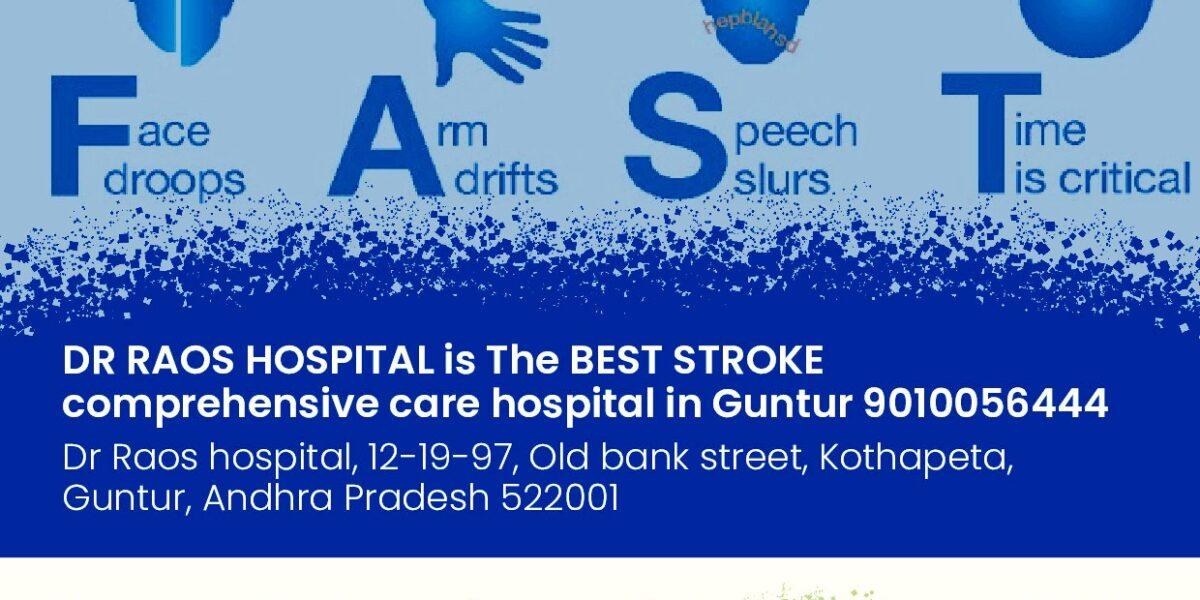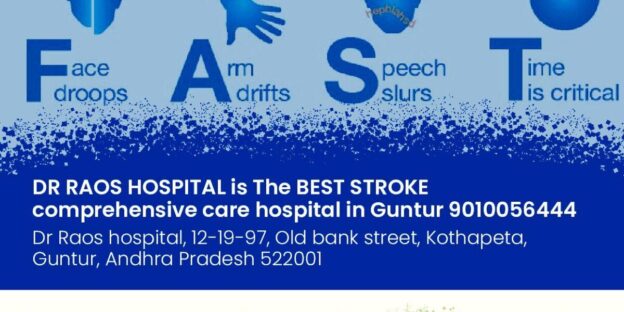Dr Raos hospital is the best comprehensive stroke center
What are your options for cerebrovascular treatment? With the advent of technology, there are more resources for stroke and stroke care than ever before. It is no more only an IV injection, it is more than that and now we can go into the blood vessel and remove the clot either through groin or thigh. Knowing about your acute treatment and rehab options is essential as speaking with your doctor about what treatment would be best for you.
What’s a Stroke?
A stroke is a severe medical or surgical condition that affects the brain. It can cause paralysis, loss of language, vision, and hearing, and other serious complications. If you or your loved one experiences any signs or symptoms of a stroke, immediately call 104 or 9010056444, or 9010057444 to get comprehensive stroke care. The sooner you receive treatment, the better your chances of recovery.
If you are having any of the following symptoms, it is essential to seek medical attention:
- Sudden weakness or numbness in one half of the body
- Shortness of breath
- Chest pain
- Trouble speaking
- Changes in vision or headache
If you doubt whether or not you have a stroke, please call your doctor immediately.
There are many different types of strokes, ischemic or hemorrhagic, but the most common is a stroke caused by an artery blockage known as ischemic, which ranges around 85%. Blood flow to the brain is decreased or stopped, which can lead to permanent damage or death.
Fortunately, many excellent hospitals are available for treating strokes and Cerebrovascular Treatment. Dr. Raos hospital in Guntur is the best comprehensive stroke center with cutting-edge technology like a biplane cath lab for mechanical thrombectomy, IV tPA treatment facilities, and the world’s best ICU care, best neurologist or interventional neurologist or best endovascular neurosurgeon, Dr. Rao along with the best staff.
Types of Stroke Care
Many people must be fully aware of the different types of stroke care. A lack of awareness can lead to confusion when choosing the right hospital for treatment. In this blog, we will discuss the different types of stroke and the best hospitals for treatment.
An ischemic stroke is the most common type of stroke. It is caused by an obstruction in an artery that supplies blood to the brain. A hemorrhagic stroke occurs when an artery or vein in the head bursts, sending blood into the brain. Other strokes include intracerebral hemorrhage (ICH), subarachnoid hemorrhage (SAH), and carotid artery dissection.
The best hospitals for ischemic stroke care are those with expertise in treating this type of stroke. These hospitals typically have highly skilled doctors and nurses who are familiar with how to treat this type of stroke. They also have state-of-the-art equipment, such as medical devices and laboratories, that are used to diagnose and monitor patients during their recovery.
Hemorrhagic strokes are less common than ischemic strokes but can still cause severe problems if not treated quickly. Causes of Strokes
Most strokes are caused by a blood clot blocking an artery to the brain. Other causes include:
– Atherosclerosis, a condition in which plaque buildup on the walls of arteries narrows them over time
– Intracranial hypertension, a condition in which too much pressure builds up inside the skull due to enlarged blood vessels
– Brain tumors
Symptoms of a stroke
A stroke can be a life-threatening event, and it’s essential to know the signs and symptoms of a stroke. Here are five things to watch for: BE FAST, ACT FAST AND SAVE BRAIN
1. Difficulty speaking or understanding speech.
2. Problems with balance or walking.
3. numbness or tingling in the arm or leg on one half of the body.
4. Sudden weakness or loss of strength in one half of the body.
5. Dizziness, lightheadedness, or fainting
Care after a stroke
When you have a stroke, you may be scared and confused. Here are some tips to help you get the care you need.
Immediate measures
1. Call your doctor or emergency room as soon as possible after a stroke. They will be able to treat you better if you are in the hospital immediately.
2. If you can, stay awake and alert during the treatment. This will help your doctors and nurses know what to do for you.
Long term measures
3. Eat small, frequent meals to stabilize your blood sugar and prevent long-term problems like malnutrition or diabetes.
4. Avoid heavy lifting, smoking, and drinking alcohol while recovering from a stroke. These activities can make the condition worse.
5. Speak with your doctor about any questions or concerns you have. They will help guide you along the best path to recovery.
Difference Between Triage and Acute Stroke Services
Regarding stroke and cerebrovascular treatment, the best hospitals can vary drastically. This is because not all strokes are the same, and not all patients require the same level of care.
Triage is the first step in determining which patients require acute stroke services. Triage involves sorting through patients based on symptoms and looking for any who may have a more severe condition that requires immediate attention.
Once patients are identified as requiring acute stroke services, their hospital will determine their eligibility for specialized treatments and care. This may include MRIs, CT scans, or even surgery.
If you or someone you know has been diagnosed with a stroke, speak with your doctor about the best hospital for your specific needs.
Who Benefits from the Care Provided by Hospitals?
Hospitals are the most common place people go for stroke and cerebrovascular treatment. However, there are other options available, such as physician’s offices.
When choosing a hospital for stroke or cerebrovascular treatment, it is crucial to consider your location and the hospital’s level of care. Hospitals with specialized Stroke and Cerebrovascular Programs typically offer more comprehensive care than general hospitals.
Patients who receive care from comprehensive stroke care hospitals can often recover more quickly than those who receive care from other sources. Dr. Raos Hospitals provides the best 360 degrees of care for stroke and cerebrovascular patients. This is because they have the expertise and resources to handle these cases appropriately.
One of the reasons Dr. Rao’s hospitals are so effective at treating stroke and cerebrovascular patients is that they have a wide range of resources available. They can use state-of-the-art equipment and technology to treat patients more effectively. In addition, hospitals have a team of specialists skilled in treating these types of conditions, like Dr. Rao, the best endovascular neurosurgeon, along with his best staff.
The benefits of receiving treatment at a hospital include the following:
– Faster recovery times than when other sources provide care
– Increased chance of full recovery
– Better quality of life due to decreased severity of symptoms
– They are cost-effective with less disability
How the Treatment Process Works
When a stroke is diagnosed, doctors will work to determine the extent of damage and will decide on the best course of treatment. Treatment may involve medication to reduce swelling and improve blood flow to the brain, surgery to remove the obstruction, or placement of a stent to keep the artery open.
Regarding Stroke Treatment, the hospitals that offer the best care are some of the most prestigious in the nation. While each hospital has specific protocols and procedures for treating strokes, many commonalities exist between the top hospitals.
First and foremost, all of the top hospitals have comprehensive stroke treatment centers. This means they have a wide array of resources and expertise to offer stroke patients. In addition, these hospitals have state-of-the-art equipment and technology available to them. These include neuroimaging (Biplane Cath lab, intraoperative CT scan, AI-based imaging soft wares), neurosurgical facilities, and highly skilled medical personnel.
Another critical factor distinguishing the best stroke hospitals is their commitment to quality care. These hospitals have established rigorous patient safety standards, and they ensure that all of their procedures are carried out with precision and care. Additionally, these institutions have a strong track record for successfully treating cerebrovascular diseases. Dr. Raos hospital stands at the top of these institutions.
Treatment options for the Acute stroke
Ischemic stroke treatment involves immediate start of antiplatelets along with IVtPA if patient comes to the hospital with in 4.5 hours and mechanical thrombectomy if patient comes to the hospital with in 24 hours and having large blood vessel occlusion.
Hemorrhagic stroke treatment involves control of the blood pressure along with removal of the bleed that causing imminent danger to the patient by using minimally invasive endoscopic or microscopic brain tubular retractor clot removal.
Common Complications following stroke
The most common complications after a stroke are:
1. Memory problems
2. Lack of mobility
3. Difficulty speaking or understanding speech
4. Difficulty with coordination and balance
5. Depression and anxiety
6. Trouble sleeping
7. Pain in the arm, hand, or leg
Conclusion
When it comes to stroke and cerebrovascular accident treatment, a few hospitals stand head and shoulders above the rest. Whether looking for the best rehabilitation program or the most advanced medical care available, these hospitals have you covered, so if you or your loved one is suffering from a stroke or vascular accident, research which hospital would be best for your needs before making any decisions. Dr Raos hospital is the tertiary care comprehensive stroke care center in Guntur and Andhra Pradesh and stands the best stroke or paralysis treatment hospital in India. Contact us @ 9010056444 or 9010057444 for reducing your disability and faster recovery from the stroke. Dr Rao is the best top ten interventional neurologist in India. Dr Rao is also the best neurosurgeon, best spine surgeon and best stroke or paralysis neurologist in Guntur and Andhra Pradesh.


